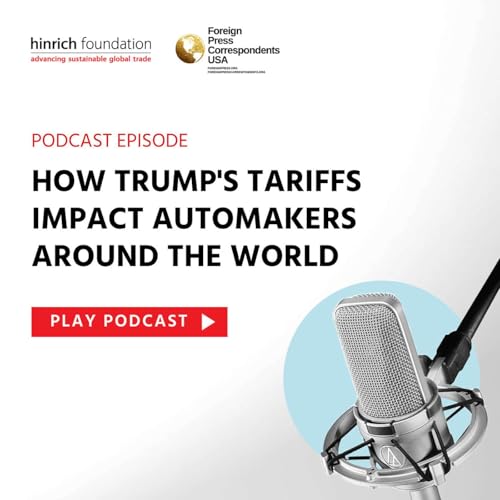
Special Ep. - How Trump's tariffs impact automakers around the world
カートのアイテムが多すぎます
カートに追加できませんでした。
ウィッシュリストに追加できませんでした。
ほしい物リストの削除に失敗しました。
ポッドキャストのフォローに失敗しました
ポッドキャストのフォロー解除に失敗しました
-
ナレーター:
-
著者:
このコンテンツについて
In this edition of the Hinrich Foundation’s podcast on global trade, Yuka Hayashi, Vice President of The Asia Group, sits down with former Wall Street Journal senior editor Paul Beckett to unpack the effects of the Trump administration’s tariffs on automakers around the world amid heightened global trade tensions.
The impact of President Trump’s auto tariffs has been uneven, with Japan, South Korea, and Germany most affected due to heavy reliance on US auto exports. Company exposure varies widely — Mitsubishi Motors faces full tariffs due to total imports for US sales, while Tesla and Ford are less affected due to complete domestic production.
Despite the US-Mexico-Canada Agreement, Trump imposed steep tariffs on Canadian and Mexican imports, citing national security under Section 232. Automakers have partly absorbed costs, but consumer prices are rising. The competition for auto production is fuelling political and economic strains globally.
Tune into this podcast as Yuka Hayashi, Vice President of The Asia Group, joins former Wall Street Journal senior editor Paul Beckett, in an interview hosted by the Association of Foreign Press Correspondents-USA and supported by the Hinrich Foundation, to break down how Trump’s auto tariffs are reshaping global supply chains as key automakers are hit and trade relations become strained. The podcast follows up on The Asia Group’s recent paper for the Hinrich Foundation, “Tariffs hit some automakers more than others.”
Download Transcript
Tune into the Hinrich Foundation’s podcast series for insights on international trade.


